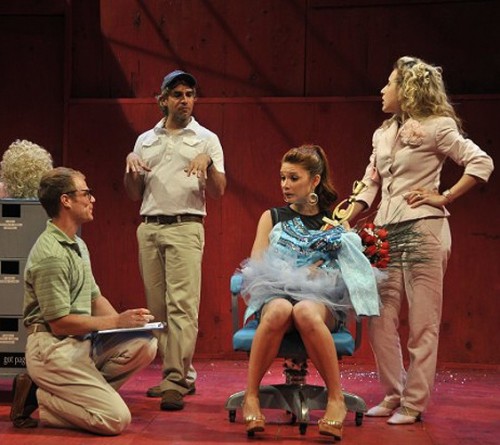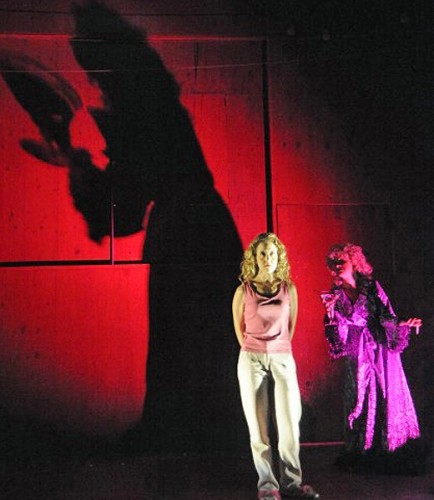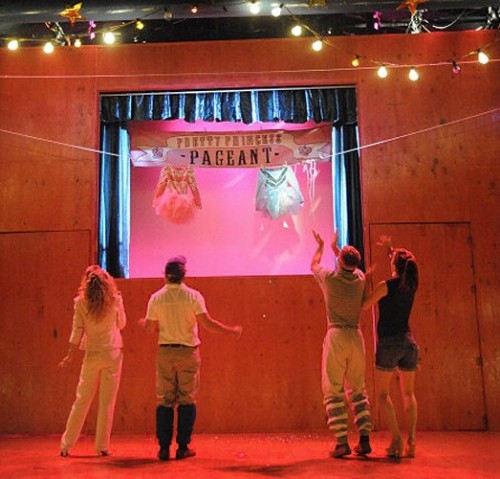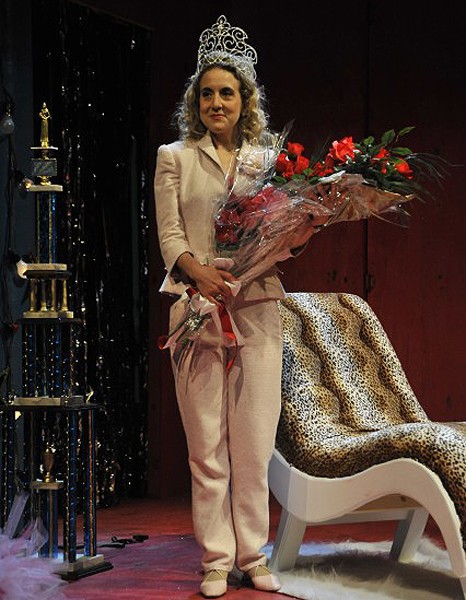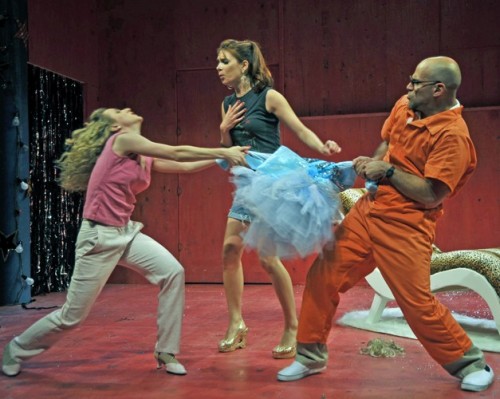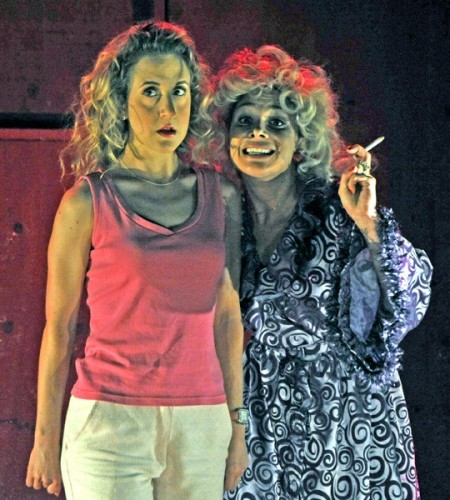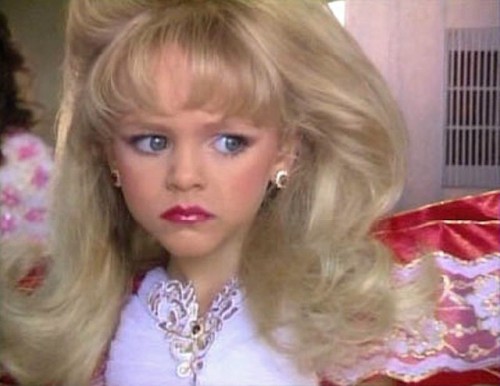Pageant Play Debuts at Berkshire Theatre Festival
Witty Comedy is Refreshing & Breezy Summer Treat
By: Larry Murray - Jul 06, 2008
Pageant Play by Matthew Wilkas and Mark Setlock, Directed by Martha Banta with Daiva Deupree/Marge, Jenn Harris/Pinky, Mark Setlock/Bobby, Matthew Wilkas/Bob. Stage Manager, Rafi Levavy, Scenic Designer, Luke Hegel-Cantarella, Costume Designer, Juessica Risser-Milne, Lighting Designer, Thom Weaver, Sound Designer, Bart Fasbender, Dance Consultant, Isadora Wolfe, Casting Director, Alan Filderman. 90 Minutes. Through July 26.
Exploring the totally twisted world of children's beauty pageants, writers Matthew Wilkas and Mark Setlock extract hundreds of laughs during the course of their creation, Pageant Play. In other hands this story about the creepy phenomenon of underage beauty contests could just as easily provoke outrage. Instead, the writers skirt the heart of the issue, preferring to make fun of these atrocious contests instead. Just as well. People behaving badly are often funny, despite their obliviousness. During the evening a few egos are bruised but no children are actually harmed. Jessica Risser-Milne who designed the costumes that stand in for the children must cringe at their mistreatment and abuse by the actors.
The opening night audience at the Unicorn Theatre clearly had an uproarious time watching the two dueling mamas declare war on each other. They employ their invisible 4-5 year old daughters as both their hostages and their weapons.
No harm comes to them because in this satirical Night of the Living Dolls, the daughters are represented only by their wardrobe. No real children get yanked around or pulled apart, just their stand ins. This is but one of several clever theatrical conceits used to pull off this send-up of kiddy pageantry.
Aiding and abetting this folly are their two coaches who can even make a butt ugly child beautiful for a fee. Set somewhere in the southern tier of these United States, Daiva Deupree and Jenn Harris play the neo-antebellum Marge and Pinky characters, a cross between Stella and Blanche of Tennessee Williams, as envisioned perhaps by John Waters.
The effervescent coaches, Bob and Bobby are portrayed bouncily by the authors, Matthew Wilkas as Bob and Mark Setlock as Bobby. Their characters are as gay as a tree full of chickadees. While utilizing plenty of camp to satirize their roles, they walk the delicate line between mixed Berkshire country audiences and the hipper ones they would find in the big cities. The resultant blend of humor was universally appreciated and applauded by an enthusiastic openng night audience.
The play itself is an alternately slight, superficial and slapstick version of an uncomfortable reality: it is the parents who most often abuse their children by ojectifying them for their own needs.
The concept for this play was prompted by the 2001 HBO documentary "Living Dolls". It told of child pageant star Swan Brooner and her well-meaning mother. This provided the starting point for the playwrights, a basic factual reference point. This film provided the backbone of the final work and can still be viewed in nine ten-minute segments on You Tube. Viewing it, one can only admire the restraint the authors of the play used to keep it light.
Children are abused through these beauty "pageants" in order to massage the egos of their parents. In other hands this could have become a polemic about how overly demanding parents can damage their children. Instead, Wilkas and Setlock keep the focus on how the contestants are packaged, and the ridiculous demands mothers will make on their children in order to win. With mountains of important sociological and psychological issues left unexplored, the evening becomes a chance to laugh at the ludicrousness of it all.
It takes a lot of theater magic to pull off this story. The two men switch costumes and characters to alternately play first the coaches, then the husbands of the two domineering mothers. One husband is in jail for spousal abuse, the other a nattered nabob with little self esteem.
One of the great joys of seeing a completely new work is that everything comes as new information as the story unfolds. For that reason it would be terribly unfair to detail the plot, since it is the twists and turns that slowly unfold that render the evening so enjoyable. The surprises become little secrets between the protagonists and the audience. We know, but the other characters on stage do not. How delicious their reactions, and how deep our belly laughs become because of it.
Martha Banta directed this production with both restraint - when called for -and mayhem - when the plot allows. Once again this summer we see the device of slamming doors and madcap chases on stage as French farce techniques take over in one hysterical scene towards the end of the play.
The cast is aided and abetted by a strange vertical wall of a set. It reminded me, oddly, of a computer screen, one with a window in the middle that would get clicked on when a winner was announced, and then a clothesline would sort of drag and drop a couple of costumes over to it whereupon lights would illuminate and glitter would fall, and the window would darken until needed again. Very 21st Century.
Despite its unfinished appearance this window wall served as hotel ballroom, house, office and studio through the use of simple lighting and strategic prop placement. It was designed by Luke Hegel-Cantarella. It might have been more effective painted white, letting some colored gels and projected texture screens help suggest the different locations. Lighting designer Thom Weaver used mismatched strings of bulbs to suggest the seediness of the pageant locations, and created a vivid and memorable silhouetted tableau of a drunken mother towering over and dominating her own daughter.
This Berkshire production plays through July 26 at the Unicorn, and its modest length of about ninety minutes makes it a perfect summer outing. Like a trashy summer novel, it is captivating, amusing and diverting, provoking few upsetting thoughts, just laughs.

